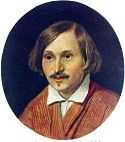A Terrible Vengeance
| "A Terrible Vengeance" | |
|---|---|
| Author | Nikolai Gogol |
| Original title | "Страшная месть" |
| Translator | Richard Pevear, Larissa Volokhonsky |
| Language | Russian |
| Published in | Evenings on a Farm Near Dikanka |
| Publication type | Book |
| Media type | Short Story |
| Publication date | 1832 |
| Published in English | 1998 |
A Terrible Vengeance (Russian: Страшная месть) is a Gothic horror story by Nikolai Gogol.[1] It was published in the second volume of his first short story collection, Evenings on a Farm Near Dikanka, in 1832, and it was probably written in late summer 1831.[2]
The short story is written in the "ornate and agitated style" characteristic to Gogol, sometimes skirting purple prose, and was a great influence on the rhythmic prose of the modernist novelist Andrei Bely.
The appearance of evil spirits, and specifically of an Antichrist figure, in A Terrible Vengeance was typical of Gogol's belief in the omnipresence of Evil in everyday life, an aspect of his religious philosophy that is uniquely direct in this story.[3] The overall construction of the story is typical of what would come to be called skaz, wherein characters are identified to a large degree by linguistic specificities of their manner of speech. Another particularity of the piece is frequent narratorial intrusion, such as asides to the reader or other violations of the narratorial frame.
The basic plot of the story evokes folklore, but there is no comparable piece in Ukrainian or Russian traditions. A similar story of a sorcerer appeared in "Pietro Apone" by German romantic Johann Ludwig Tieck, published in Russian in 1828. Other potential subtexts are Tieck's Karl von Berneck (1797) and E. T. A. Hoffman's novella Ignaz Denner (1816).[2][4]
Synopsis
The story opens at the wedding of the Cossack yesaul Gorobets's son in a neighborhood of Kiev. Among the guests are the recently married Cossack, pan Danilo Burulbash, and his wife, pani Katerina, who live just across the Dnieper River. They are honored guests, Danilo is Gorobets's sworn brother. Not present, though, is Katerina's father, who was expected to appear after having spent 21 years in foreign lands.
As soon as Katerina's father arrives at her and Danilo's home the next morning, an argument starts when he demands that she explain her late return the previous night. Danilo also notices that, unlike the Cossacks, his father-in-law refuses to eat halušky and pork, only pretends to drink mead, and generally acts more like the Poles and Turks than one of their own. In the ensuing saber and gun fight, Katerina's father shoots Danilo in the arm before she intervenes and begs them to forgive one another.
Katerina then tells Danilo about her dream the previous night about a sorcerer who wants to marry her, which Danilo takes to be a grave sign. Later in the evening, Danilo notices unexpected flashes from a distant, abandoned castle. He makes sure Katerina is safe at home and goes to investigate. When he climbs up a tree outside the lit window, he sees Katerina’s father calling up spells, and her soul appears in a blue haze. The sorcerer commands her to marry him, Danilo is horrified to discover that his father-in-law is a sorcerer. Once Danilo returns home, his wife recounts to him a strange incestuous dream, which matches what Danilo witnessed in the castle. She accepts Danilo's explanation that her father is the Antichrist.
Eventually, the hulking knight catches up with the sorcerer and casts him into an abyss where corpses await to eternally gnaw on his body. The largest of the corpses is a man named Petro, punished so by God for murdering his brother Ivan and Ivan's son out of greed. The knight and boy appear to be their spirits.
Film
A 20-minute animated adaptation of the story was made at Kievnauchfilm studio in 1988 (with the same title). The film keeps the original dark tone and was not aimed at children. It was directed by Mikhail Titov.[5]
References
- ↑ Gogol, Nikolai (1998) [1832]. The Collected Tales. Translated by Richard Pevear, Larissa Volokhonsky. New York, London, Toronto: Alfred A. Knopf. pp. 63–103. ISBN 978-0-307-26969-0.
- ↑ 2.0 2.1 Gogol, N. V. (2003). Polnoe sobranie sochinenie 1. Iu. V. Mann, E. E. Dmitrieva (eds.). Moskva: Nauka. pp. 185–217, 791–831 (notes). ISBN 5-02-032679-8.
- ↑ Florovsky, Georges (1989). "The Quest for Religion in 19th Century Russian Literature: Three Masters: Gogol, Dostoevsky, Tolstoy". In Richard S. Haugh (ed.). Theology and Literature. The Collected Works of Georges Florovsky 11 (Second ed.). Vaduz: Büchervertriebsanstalt. pp. 13–32. ISBN 3-905238-15-2.
- ↑ Gippius, Vasiliĭ Vasilʹevich (1989). Gogol. Robert A. Maguire (trans.). p. 224. ISBN 978-0-8223-0907-9.
- ↑ "Russian animation in letters and figures". Animator.ru. 2012.
| |||||||||||||||||||||||||||||||||
